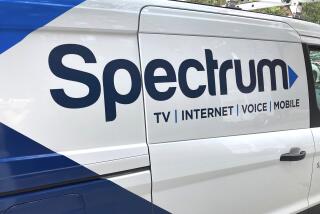An online hookup to a lower phone bill
- Share via
When Marlene Johansing moved to San Miguel de Allende in Mexico, her phone bills became one of her biggest everyday expenses.
Her children, brothers and lifelong friends -- not to mention investment advisors and doctors -- were situated along a freckled path stretching from San Diego to Santa Barbara. Keeping connected by phone, even sparingly, cost $250 to $300 a month, she said.
But last year she discovered voice over Internet protocol, an emerging technology that allows consumers to make phone calls through an Internet connection rather than old-fashioned phone lines.
The Internet calls are more reliable than her former long-distance phone service, she said, at a fraction of the cost. She now spends $30 a month and talks as long as she likes.
“It’s great,” Johansing said. “I talk over my regular phone, but it’s cheaper.”
About 5 million U.S. households have taken the same tack, according to Forrester Research Inc. in Cambridge, Mass. That’s a tiny fraction of the domestic telecommunications market, but the growth has been tremendous -- roughly 200% in the last year, said Maribel Lopez, a vice president at Forrester.
Lopez attributes a big part of the growth spurt to a move by marketers of Internet-based phone service to dispense with the techno-babble and focus on its key advantage -- the service is often far less expensive than traditional phone service.
“The market was clicking along, growing by 100,000 subscribers here, 150,000 there. And then the cable companies came in about a year ago, just offering cheap digital phone service,” Lopez said. “ ‘Cheap phone’ resonates.”
Many people said they’d been reluctant to consider Internet phone service because they assumed it would require technical expertise to make a call.
That was once true, Lopez said. Even now, some customers make calls on their computers, with a headset and microphone attached.
But the industry’s future lies in phones that look just like traditional ones but operate differently.
An Internet phone connects to a different wiring system, but from the consumer’s standpoint, the service is nearly identical: You pick up the phone, hear a dial tone, dial a number by pressing buttons, and wait for someone to answer the ring.
“You don’t have to think about it; you don’t need to know how it works,” said Marshall Brain, founder of an Atlanta-based website called HowStuffWorks. “You have to plug in a few wires, but then everything magically happens in the background.”
These phone systems are offered through a wide array of companies, including Internet-only carriers such as Vonage and Skype as well as big cable firms such as Comcast, Time Warner Cable and Charter Communications.
You need two things to use Internet phone service. The first is a broadband Internet connection -- such as cable-modem or DSL service instead of a dial-up link. The second is a backup plan.
The broadband connection is essential because of the way Internet phones work. The system translates the sound of your voice into digital “packets” that then skitter along open Internet lines to the phone on the other side.
Because this must be done with lightning speed for the connection to sound normal, the audio packets need lots of bandwidth when rushing through the Internet.
A backup plan is important because Net connections don’t work when the power goes out or when the cable or DSL service is on the fritz.
Those who can’t go without phone service for any length of time would be wise to maintain a working cellphone or land line.
Then, too, there’s 911 emergency service. Some Internet phone services do not offer 911 service because there is no location or street address connected to a home computer, as there is to a traditional phone.
Vonage overcomes this obstacle by having users register an address when they sign up. The company transmits the registered address to the emergency response system when connecting a 911 call.
Skype executives suggest that consumers maintain at least one land line for emergency calls.
Are the savings with Internet phone services worth the inconvenience of switching or potentially losing phone service in a blackout?
The answer depends on the consumer’s phone use, Lopez said. For some people, the biggest saving will be from the absence of fees and taxes that show up on an ordinary phone bill but don’t apply to Internet calls.
Brain says extras, such as voice mail and caller ID, are often free with Internet phone plans.
Anyone who makes significant numbers of international calls, as Johansing does, can save a bundle on calls too.
*
Kathy M. Kristof welcomes your comments but regrets that she cannot respond to every question. Write to Personal Finance, Business Section, Los Angeles Times, 202 W. 1st St., Los Angeles, CA 90012, or e-mail kathy.kristof@latimes.com. For previous columns, visit latimes.com/kristof.






